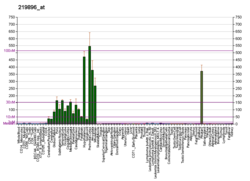Protein-coding gene in humans
Neuron-specific vesicular protein calcyon is a protein that in humans is encoded by the CALY gene .[ 5] [ 6] Calcyon .
Function The protein encoded by this gene is a type II single transmembrane protein . It is required for maximal stimulated calcium release after stimulation of purinergic or muscarinic but not beta-adrenergic receptors . The encoded protein interacts with dopamine receptor D1 and may interact with other DA receptor subtypes and/or GPCRs .[ 6]
Interactions
References
^ a b c GRCh38: Ensembl release 89: ENSG00000130643 – Ensembl , May 2017^ a b c GRCm38: Ensembl release 89: ENSMUSG00000025468 – Ensembl , May 2017^ "Human PubMed Reference:" . National Center for Biotechnology Information, U.S. National Library of Medicine .^ "Mouse PubMed Reference:" . National Center for Biotechnology Information, U.S. National Library of Medicine .^ Heijtz RD, Alexeyenko A, Castellanos FX (July 2007). "Calcyon mRNA expression in the frontal-striatal circuitry and its relationship to vesicular processes and ADHD" . Behavioral and Brain Functions . 3 (1): 33. doi :10.1186/1744-9081-3-33 PMC 1949817 PMID 17623072 . ^ a b "CALY calcyon neuron specific vesicular protein [ Homo sapiens (human) ]" .^ Kim JH, Jung HG, Kim A, Shim HS, Hyeon SJ, Lee YS, et al. (March 2021). "Hevin-calcyon interaction promotes synaptic reorganization after brain injury" . Cell Death and Differentiation . 28 (9): 2571– 2588. doi :10.1038/s41418-021-00772-5 PMC 8408247 PMID 33753902 .
Further reading
Milligan G, White JH (October 2001). "Protein-protein interactions at G-protein-coupled receptors". Trends in Pharmacological Sciences . 22 (10): 513– 8. doi :10.1016/S0165-6147(00)01801-0 . PMID 11583808 . Ali MK, Bergson C (December 2003). "Elevated intracellular calcium triggers recruitment of the receptor cross-talk accessory protein calcyon to the plasma membrane" . The Journal of Biological Chemistry . 278 (51): 51654– 63. doi :10.1074/jbc.M305803200 PMID 14534309 . Luo X, Kranzler H, Lappalainen J, Rosenheck R, Charney D, Zuo L, Erdos J, van Kammen DP, Gelernter J (February 2004). "CALCYON gene variation, schizophrenia, and cocaine dependence" . American Journal of Medical Genetics. Part B, Neuropsychiatric Genetics . 125B (1): 25– 30. doi :10.1002/ajmg.b.20092 PMID 14755439 . S2CID 24881261 . Laurin N, Misener VL, Crosbie J, Ickowicz A, Pathare T, Roberts W, Malone M, Tannock R, Schachar R, Kennedy JL, Barr CL (December 2005). "Association of the calcyon gene (DRD1IP) with attention deficit/hyperactivity disorder". Molecular Psychiatry . 10 (12): 1117– 25. doi :10.1038/sj.mp.4001737 . PMID 16172615 . S2CID 25367235 . Xiao J, Dai R, Negyessy L, Bergson C (June 2006). "Calcyon, a novel partner of clathrin light chain, stimulates clathrin-mediated endocytosis" . The Journal of Biological Chemistry . 281 (22): 15182– 93. doi :10.1074/jbc.M600265200 PMID 16595675 . Olsen JV, Blagoev B, Gnad F, Macek B, Kumar C, Mortensen P, Mann M (November 2006). "Global, in vivo, and site-specific phosphorylation dynamics in signaling networks" . Cell . 127 (3): 635– 48. doi :10.1016/j.cell.2006.09.026 PMID 17081983 . S2CID 7827573 . Kruusmägi M, Zelenin S, Brismar H, Scott L (October 2007). "Intracellular dynamics of calcyon, a neuron-specific vesicular protein". NeuroReport . 18 (15): 1547– 51. doi :10.1097/WNR.0b013e3282f03f51 . PMID 17885599 . S2CID 24544827 .





